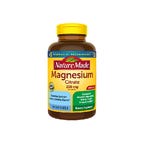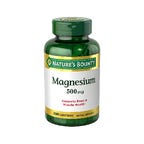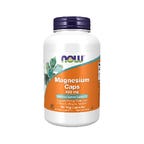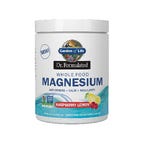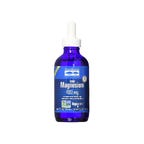Magnesium is having a moment. There are countless videos on social media highlighting the important role magnesium plays in our overall well-being. But despite magnesium’s importance, an estimated 75% of US adults aren’t getting enough of it in their diets. Not only does it support energy production and aid in muscle and nerve health, but it may help stave off insomnia. Are you getting enough daily magnesium?
Before you buy a magnesium supplement or any dietary supplement, talk to your doctor to make sure you need it. Too much magnesium from food sources isn’t a concern for the average adult, but the same isn’t true for supplements. If you take in too much magnesium from supplements, it can cause nausea, diarrhea and abdominal pain.
Here’s what you need to know about finding the best magnesium supplement.
What is magnesium?
Magnesium is one of the most abundant minerals in the human body — it plays a vital role in various bodily processes such as muscle movements and brain function. Studies reveal magnesium may improve depression symptoms, sleep, heart health and blood sugar levels.
There are many types of magnesium, which include magnesium aspartate, magnesium carbonate, magnesium chloride, magnesium citrate, magnesium gluconate, magnesium hydroxide, magnesium lactate, magnesium oxide and magnesium phosphate. The form of magnesium is determined by what it is bound with (for example, magnesium citrate is magnesium bound with citric acid), and some forms are more easily absorbed by the body than others.
Magnesium is found naturally in foods such as:
- Seeds
- Nuts
- Greens
- Soy milk
- Beans
- Whole grains
If your diet lacks many of these foods, you may need added magnesium. If you already take a multivitamin with magnesium, you don’t need an extra supplement. Consult your doctor before adding magnesium supplements to your diet.
We reviewed a number of magnesium supplements, along with their prices, brands, ingredients and consumer reviews. Here are our picks for the best magnesium supplements.
Dosage: 2 softgels, daily with a meal
Form of magnesium: Magnesium citrate
Nature Made is a reliable brand that often makes our lists. Not only are its vitamins affordable, but Nature Made products are United States Pharmacopeia Verified. Its magnesium supplements are also gluten-free and don’t contain any dyes, synthetic colors or flavors. Each dosage of two softgels contains 250 milligrams of magnesium in the form of magnesium citrate, about 60% of recommended daily value. In addition to magnesium, the softgels also contain medium chain triglycerides, gelatin, rapeseed, glycerin, water and yellow beeswax.
Pros
Cons
- Only a 60-day supply in one bottle, less than the other brands on this list
- Larger pills may be difficult to swallow
Dosage: 1 tablet, daily with a meal
Form of magnesium: Magnesium oxide
Nature’s Bounty is another well-known and accessible brand. Sold in Target, Walmart, Walgreens and CVS, Nature’s Bounty has been producing quality vitamins for over 50 years. Its products, including its magnesium supplement, contain no artificial color, flavor, sweeteners, sugar, starch, soy, gluten, wheat, yeast or fish. The supplements contain 500 mg of magnesium oxide, which is about 119% of the daily recommended value. They also contain vegetable cellulose, dicalcium phosphate, calcium carbonate, citric acid, medium chain triglycerides, polydextrose and vegetable magnesium stearate.
Pros
- One bottle contains 200 tablets
- Suitable for vegetarians
Cons
- Magnesium oxide is harder for the body to absorb
- Dosage is slightly above the recommended daily value
Dosage: 1 capsule, daily
Form of magnesium: Magnesium oxide, magnesium citrate, magnesium aspartate
Supplements by Now are for vegans and vegetarians. The capsules are non-GMO and are free of wheat, gluten, soy, milk, egg, fish, shellfish, tree nuts and sesame. Now’s magnesium supplements contain 400 milligrams of a magnesium blend (magnesium oxide, magnesium citrate and magnesium aspartate), totaling 95% of the daily recommended value. The other ingredients include hypromellose (cellulose capsule), rice flour, silicon dioxide and stearic acid (vegetable source).
Pros
- Very few other ingredients
- Three types of magnesium to optimize absorption
Cons
- The magnesium blend doesn’t specify how much of each type you’re getting
- Pills are large
Dosage: 1 teaspoon in 8 ounces of water, daily
Form of magnesium: Magnesium carbonate
Garden of Life offers a powder magnesium supplement for those who don’t want to swallow pills. Just add 1 teaspoon to a cup of room temperature water, let fizz, stir well and drink. The powder contains a magnesium blend of non-GMO citric acid, magnesium carbonate and sodium bicarbonate, organic brown rice protein magnesium chelate, organic raspberry flavor, organic lemon flavor and organic stevia extract (leaf). There are also three probiotic strains added: Lactobacillus plantarum, Lactobacillus bulgaricus and Lactobacillus acidophilus. The magnesium blend is 350 milligrams, which is 85% of the daily recommended value. There is also 120 milligrams of sodium, and the probiotic blend is 3.5 milligrams.
Pros
- Includes a probiotic blend
- A choice of two flavors: raspberry lemon or orange
Cons
- Tart, strong taste
- Reviews state that the powder doesn’t dissolve well
Dosage: 4 milliliters (4 full droppers; 0.8 teaspoons), daily with juice or food
Form of magnesium: Magnesium chloride
Liquid magnesium is also a great option for those who dislike swallowing pills. Trace Minerals’ liquid magnesium comes with a measured dropper, making it easy to know how much magnesium you are getting. However, it is recommended that you don’t take all 4 milliliters in one sitting. It’s best to distribute the serving size throughout the day. One daily dose of this liquid is 400 milligrams of magnesium chloride — 100% of the daily recommended value. In addition to magnesium, the bottle also contains potassium, sulfate and boron. All of the ingredients are natural, non-GMO and gluten-free and made without artificial flavors, sweeteners and any known allergens.
Pros
- Alternative to swallowing pills
- Certified vegan
Cons
- Recommended to divide dosage throughout the day
- Bad taste, must mix with juice or food
Is it OK to take magnesium supplements daily?
How much magnesium should you take?
What are the symptoms of low magnesium?
